词汇学论文
- 格式:doc
- 大小:162.50 KB
- 文档页数:9
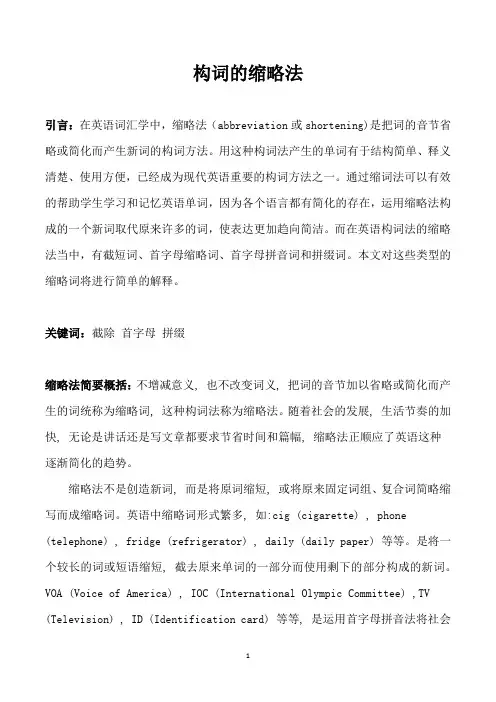
构词的缩略法引言:在英语词汇学中,缩略法(abbreviation或shortening)是把词的音节省略或简化而产生新词的构词方法。
用这种构词法产生的单词有于结构简单、释义清楚、使用方便,已经成为现代英语重要的构词方法之一。
通过缩词法可以有效的帮助学生学习和记忆英语单词,因为各个语言都有简化的存在,运用缩略法构成的一个新词取代原来许多的词,使表达更加趋向简洁。
而在英语构词法的缩略法当中,有截短词、首字母缩略词、首字母拼音词和拼缀词。
本文对这些类型的缩略词将进行简单的解释。
关键词:截除首字母拼缀缩略法简要概括:不增减意义, 也不改变词义, 把词的音节加以省略或简化而产生的词统称为缩略词, 这种构词法称为缩略法。
随着社会的发展, 生活节奏的加快, 无论是讲话还是写文章都要求节省时间和篇幅, 缩略法正顺应了英语这种逐渐简化的趋势。
缩略法不是创造新词, 而是将原词缩短, 或将原来固定词组、复合词简略缩写而成缩略词。
英语中缩略词形式繁多, 如:cig (cigarette) , phone (telephone) , fridge (refrigerator) , daily (daily paper) 等等。
是将一个较长的词或短语缩短, 截去原来单词的一部分而使用剩下的部分构成的新词。
VOA (Voice of America) , IOC (International Olympic Committee) ,TV (Television) , ID (Identification card) 等等, 是运用首字母拼音法将社会组织、政治组织或特殊名词短语以及技术术语的名称的首字母结合起来构成的新词。
一、截短词截短词是截除原词的某一(或某些)音节或“截头去尾”的方法产生新词的构词方法。
在这其中,分为截除词尾、截除词首、截除首尾和截除词腰。
大约自18世纪, 英语中出现了截短词, 如笛福在《鲁滨逊漂流记》中用了though的截短形式。
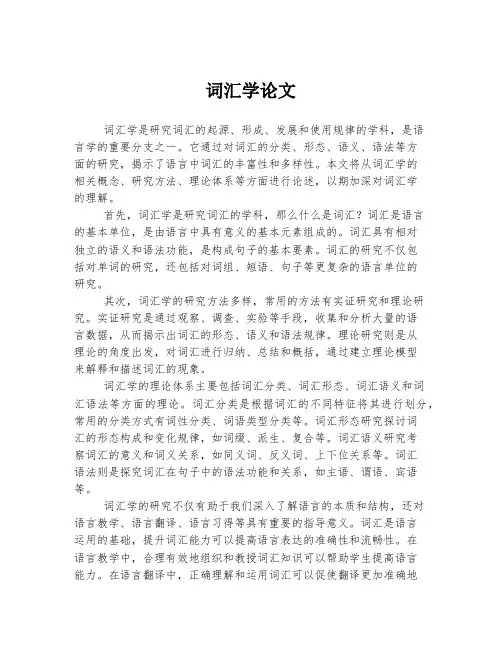
词汇学论文词汇学是研究词汇的起源、形成、发展和使用规律的学科,是语言学的重要分支之一。
它通过对词汇的分类、形态、语义、语法等方面的研究,揭示了语言中词汇的丰富性和多样性。
本文将从词汇学的相关概念、研究方法、理论体系等方面进行论述,以期加深对词汇学的理解。
首先,词汇学是研究词汇的学科,那么什么是词汇?词汇是语言的基本单位,是由语言中具有意义的基本元素组成的。
词汇具有相对独立的语义和语法功能,是构成句子的基本要素。
词汇的研究不仅包括对单词的研究,还包括对词组、短语、句子等更复杂的语言单位的研究。
其次,词汇学的研究方法多样,常用的方法有实证研究和理论研究。
实证研究是通过观察、调查、实验等手段,收集和分析大量的语言数据,从而揭示出词汇的形态、语义和语法规律。
理论研究则是从理论的角度出发,对词汇进行归纳、总结和概括,通过建立理论模型来解释和描述词汇的现象。
词汇学的理论体系主要包括词汇分类、词汇形态、词汇语义和词汇语法等方面的理论。
词汇分类是根据词汇的不同特征将其进行划分,常用的分类方式有词性分类、词语类型分类等。
词汇形态研究探讨词汇的形态构成和变化规律,如词缀、派生、复合等。
词汇语义研究考察词汇的意义和词义关系,如同义词、反义词、上下位关系等。
词汇语法则是探究词汇在句子中的语法功能和关系,如主语、谓语、宾语等。
词汇学的研究不仅有助于我们深入了解语言的本质和结构,还对语言教学、语言翻译、语言习得等具有重要的指导意义。
词汇是语言运用的基础,提升词汇能力可以提高语言表达的准确性和流畅性。
在语言教学中,合理有效地组织和教授词汇知识可以帮助学生提高语言能力。
在语言翻译中,正确理解和运用词汇可以促使翻译更加准确地传达原文的意思。
在语言习得中,掌握词汇技巧可以帮助学习者扩展语言知识,提高自己的语言水平。
总之,词汇学作为语言学的重要分支,对于理解语言的结构和功能具有重要的意义。
通过对词汇的分类、形态、语义、语法等方面的研究,可以揭示词汇的丰富性和多样性。
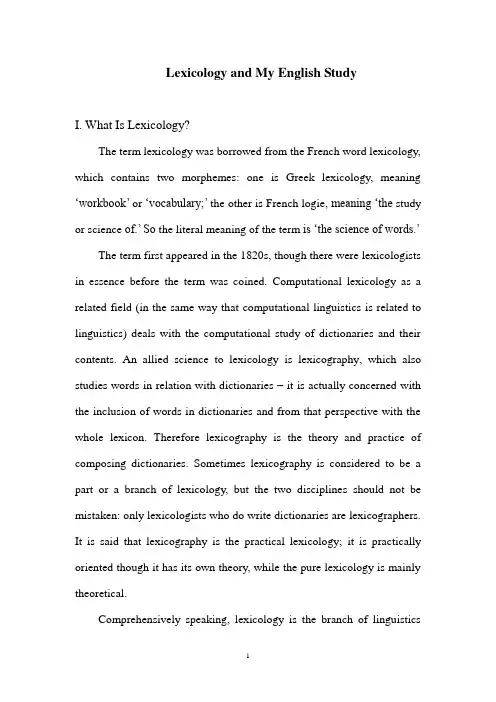
Lexicology and My English StudyI. What Is Lexicology?The term lexicology was borrowed from the French word lexicology, which contains two morphemes: one is Greek lexicology, meaning ‘workbook’ or ‘vocabulary;’ the other is French logie, meaning ‘the study or science of.’ So the literal meaning of the term is ‘the science of words.’The term first appeared in the 1820s, though there were lexicologists in essence before the term was coined. Computational lexicology as a related field (in the same way that computational linguistics is related to linguistics) deals with the computational study of dictionaries and their contents. An allied science to lexicology is lexicography, which also studies words in relation with dictionaries – it is actually concerned with the inclusion of words in dictionaries and from that perspective with the whole lexicon. Therefore lexicography is the theory and practice of composing dictionaries. Sometimes lexicography is considered to be a part or a branch of lexicology, but the two disciplines should not be mistaken: only lexicologists who do write dictionaries are lexicographers. It is said that lexicography is the practical lexicology; it is practically oriented though it has its own theory, while the pure lexicology is mainly theoretical.Comprehensively speaking, lexicology is the branch of linguisticsconcerned with the study of the vocabulary of a given language. It deals with words, their origin, development, history, structure, meaning and application. In short, it is the study of the signification and application of words.Ⅱ. Aims and Significance of LexicologyThe aim of the term lexicology is to give a systematic description of the English vocabulary. Concretely speaking, English lexicology offers students an insight into the origin and development of the English vocabulary. It deals with meanings of Modern English words and their changes in the course of historical development. It discusses the problems of word-structure and word-formation in English, including the formation of new words which have appeared since the 1960s. It also it also studies the use of English words, phrases and idioms.The significance of lexicology for language learning is also evident. The term will help the learners to enlarge their vocabulary and improve their ability to analyze and use English words. For instance, the study of new words, synonyms, figures of speech, etc. will arouse the interest of the learners on the one hand, and enhance their ability to choose the correct and expressive words in writing and speech on the other hand.Language learning requires practice. Practice makes perfect. Without practice there would be no theory. English lexicology as a theory of Modern English may be useful in vocabulary study because it derivesfrom practice and should guide practice. Students will use the basic knowledge of English lexicology to understand the material already familiar to them from English classes, and apply it in their further study of English.Ⅲ. Language, Linguistics and LexicologyBriefly speaking, lexicology deals with words. Words are the foundation and core of language. We know that without words, there would be no language, while without language, there would be no linguistics. Therefore, words, that is, lexicology, language and linguistics are very closely interrelated with one another. Before studying lexicology, we should learn about what language is and what linguistics is.Ⅳ. The Connection of Lexicology with phonetics and grammar and stylistics1) With phonetics:Phonetics is the study and systematic classification of the sounds made in spoken utterance, that is, the study of speech sounds. It is closely related to lexicology.Without sound there is no word because every word is unity of sound and meaning.2) With grammar:V ocabulary and grammar are organically related to one another. In learning a language, attention to grammar is as important as attention tovocabulary. Joseph Stalin pointed out that the vocabulary is the building material of a language. The vocabulary of a language assumes tremendous importance when it comes under the control of grammar, which is concerned with the modification in front of words and the combination of words into sentences.3) With stylistics:Stylistics is “the study of optional variations in the sounds, forms, or vocabulary of a language as characteristic of different uses of language, different situations of use, or different literary typ es.” Lexicology studies stylistics variants on the basis of meanings of words and their changes: synonyms, antonyms, figures of speech, etc.Stylistics is concerned with language variety differing according to use rather than user. The same user may use different varieties for different purposes, different situations, in conversation with different people, to produce different effects. The same subject matter can be expressed in different styles.Ⅴ. Two Approaches of the study of LexicologyThere are two main approaches to the study of lexicology, that is, synchronic and diachronic.The term synchronic means describing a language as it exists at one point of time. The term diachronic means concerned with historical development of a language.A synchronic approach is an approach to the study of a language at one period of time, whereas a diachronic approach is an approach to the study of the change in a language that took place over a period of time. Ⅵ. The Division of the History of the EnglishThe history of the English language is divided into three periods.1) The period from 450 to 1150 is known as the Old English or Anglo-Saxon period. It is described as the period of full inflections, since during most of this period the case endings of the noun, the adjective, and the conjugation of the verb were not weakened.2) The period from 1150 to 1500 is known as the Middle English period. During this period the inflections, which had begun to break down towards the end of the Old English period, became greatly reduced, and it is known as the period of the leveled inflections.3) The period from 1500 to the present day is called the Modern English period. A large part of the original inflectional system has disappeared, and it is known as the period of lost inflections.Ⅶ. The Main Processes of English Word-formationThere are four main types of word-formation in English:1) Prefixation:Affixation includes prefixation and suffixation. Affixation is the morphological process whereby grammatical or lexical information is added to the base.Affixation has played an active part in the course of the development of the English language. It is not only an age-old, but also a productive method in English word-building.What is prefixation?Prefixation is a main type of word-formation putting a prefix in front of the base, sometimes with, but more usually without a change of word class, e.g. dislike (dis + like).2) Suffixation:Suffixation is a main type of word-formation, putting a suffix after the base, sometimes without, but more usually with a change of word class, e.g. frankness (frank + ness)The primary function of prefixes is to effect a semantic modification of the base, and the chief function of suffixes is to change the word class of the base, although suffixes have only a small semantic role. Therefore suffixes may be classified into four categories according to the word class.3) Conversion:Conversion (or full conversion) is a main type of word-formation assigning the base to a different word class with no change of form. For example, the verb release is converted to the noun release.In the English language conversion is unusually prominent as a word-formation process. Of course, conversion, like other main types ofword-formation, is treat as a process now available for extending the lexical resources of the English language.There are two kinds of conversion: full conversion and partial conversion.4) Compounding:Compounding is a main type of word-formation adding one base to another, such that usually the one placed in front in some sense subcategorizes the one that follows, e.g. blackbird, etc.Compounding can occur not only in the three major word classes, nouns and, to lesser extent, adjectives, and, to least extent, verbs but also in other word classes: prepositions, such as into, within, by means of, instead of, etc. pronouns, such as each other, one another, anybody, someone, herself, itself, etc. and adverbs, such as headlong, somehow, somewhere, upside down, inside out, etc.A compound is a lexical until consisting of more than one base and functioning both grammatically and semantically as a single word. Compounds usually comprise two bases only, however internally complex each may be.Ⅷ. English IdiomsIdioms are very important and extremely interesting part of language. They are commonly used in all styles of language: informal and formal, spoken and written. If we can understand and use idioms correctly, ourlanguage skills increase constantly. One important problem our students have with idioms is how we understand them in our daily study.The best way to understand an idiom is to see it in context. Let us give an example below.If someone says: This ti n opener’s driving me round the bend! I think I’ll throw it away and get a new one. Then the context and common sense tells us that drive round the bend refers to something different from driving a car round a curve in the road. So the context points out that the tin opener is not working properly and that it’s having an effect on the person using it.Drive or send sb. round the bend is an idiom used as an informal style meaning ‘to make someone very bored or very angry.’Ⅸ. British and American EnglishGrammatical differences between British and American English are few. The more noticeable differences are phonetic and especially lexical. It does not seem likely that distinctions between British English and American English will become more extensive. On the contrary, as the modes of communication have improved, the tendency is towards uniformity and better understanding between the people of the two countries.But why does American English differ from British English?There are two reasons for this.Firstly, British English itself changed in the course of time. All languages change as time passes. English is no exception. That is why Chaucer’s English is different from Shakespeare’s English, and why Shakespeare’s English is different from contemporary Engli sh.Take the following English word borrowed from Latin and Greek for example.Such words as apparatus, complex, focus, maximum, minimum, series, etc. appeared in English only after the year 1600.In the past fifty years British English has adopted a great number of words that originated in American English.Words like cafeteria, highlight, hotrod, OK, etc. are example.Secondly, American English has acquired a character of its own. It reflects the growth, development and history of American society.In the earliest period a number of words denoting places, plants, animals, tools, and customs which existed in America were added to the English language, e.g.Hickory—a type of tree of North America which provides hard wood and bears nuts.Moose—a type of large deer, with very large flat horns, that lives in the northern pert of America.The above-mentioned words belong to American English and were borrowed from American Indian languages.After the American Independence a number of words related to institutions appeared, e.g. assembly, congress, president, representative, vice-president, etc.Strictly speaking, British English is the English spoken by the great majority of educated people in South and Southeast England, especially in London and its vicinity. BrE or BE is shot for British English. American English is General American spoken by the great majority of the American people. AmE or AE is short for American English.References:I.Chengzhang Lin﹠Shiping Liu An Introduction To EnglishLexicology, WuHan University Press FourthII.Wikipedia。
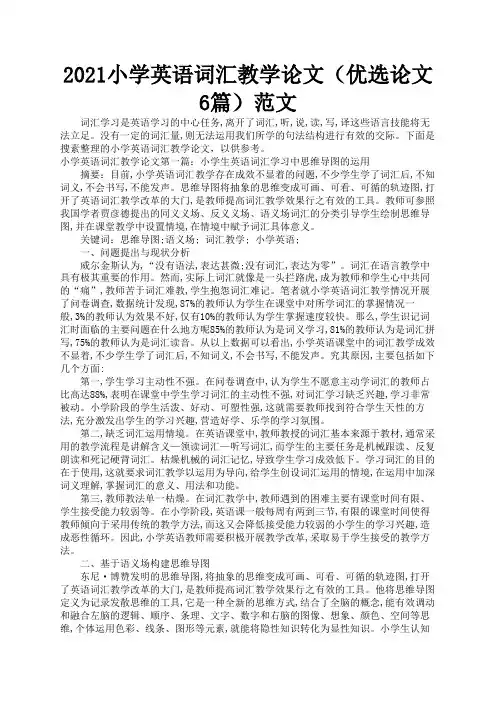
2021小学英语词汇教学论文(优选论文6篇)范文 词汇学习是英语学习的中心任务,离开了词汇,听,说,读,写,译这些语言技能将无法立足。
没有一定的词汇量,则无法运用我们所学的句法结构进行有效的交际。
下面是搜素整理的小学英语词汇教学论文,以供参考。
小学英语词汇教学论文第一篇:小学生英语词汇学习中思维导图的运用 摘要:目前,小学英语词汇教学存在成效不显着的问题,不少学生学了词汇后,不知词义,不会书写,不能发声。
思维导图将抽象的思维变成可画、可看、可循的轨迹图,打开了英语词汇教学改革的大门,是教师提高词汇教学效果行之有效的工具。
教师可参照我国学者贾彦德提出的同义义场、反义义场、语义场词汇的分类引导学生绘制思维导图,并在课堂教学中设置情境,在情境中赋予词汇具体意义。
关键词:思维导图;语义场; 词汇教学; 小学英语; 一、问题提出与现状分析 威尔金斯认为,“没有语法,表达甚微;没有词汇,表达为零”。
词汇在语言教学中具有极其重要的作用。
然而,实际上词汇就像是一头拦路虎,成为教师和学生心中共同的“痛”,教师苦于词汇难教,学生抱怨词汇难记。
笔者就小学英语词汇教学情况开展了问卷调查,数据统计发现,87%的教师认为学生在课堂中对所学词汇的掌握情况一般,3%的教师认为效果不好,仅有10%的教师认为学生掌握速度较快。
那么,学生识记词汇时面临的主要问题在什么地方呢85%的教师认为是词义学习,81%的教师认为是词汇拼写,75%的教师认为是词汇读音。
从以上数据可以看出,小学英语课堂中的词汇教学成效不显着,不少学生学了词汇后,不知词义,不会书写,不能发声。
究其原因,主要包括如下几个方面: 第一,学生学习主动性不强。
在问卷调查中,认为学生不愿意主动学词汇的教师占比高达88%,表明在课堂中学生学习词汇的主动性不强,对词汇学习缺乏兴趣,学习非常被动。
小学阶段的学生活泼、好动、可塑性强,这就需要教师找到符合学生天性的方法,充分激发出学生的学习兴趣,营造好学、乐学的学习氛围。
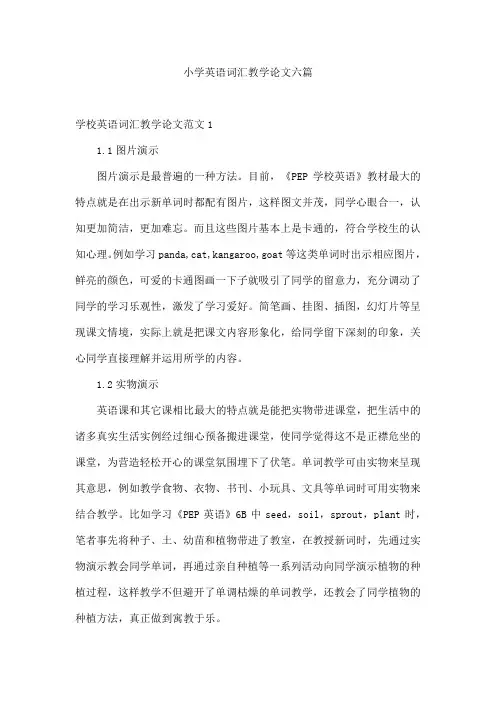
小学英语词汇教学论文六篇学校英语词汇教学论文范文11.1图片演示图片演示是最普遍的一种方法。
目前,《PEP学校英语》教材最大的特点就是在出示新单词时都配有图片,这样图文并茂,同学心眼合一,认知更加简洁,更加难忘。
而且这些图片基本上是卡通的,符合学校生的认知心理。
例如学习panda,cat,kangaroo,goat等这类单词时出示相应图片,鲜亮的颜色,可爱的卡通图画一下子就吸引了同学的留意力,充分调动了同学的学习乐观性,激发了学习爱好。
简笔画、挂图、插图,幻灯片等呈现课文情境,实际上就是把课文内容形象化,给同学留下深刻的印象,关心同学直接理解并运用所学的内容。
1.2实物演示英语课和其它课相比最大的特点就是能把实物带进课堂,把生活中的诸多真实生活实例经过细心预备搬进课堂,使同学觉得这不是正襟危坐的课堂,为营造轻松开心的课堂氛围埋下了伏笔。
单词教学可由实物来呈现其意思,例如教学食物、衣物、书刊、小玩具、文具等单词时可用实物来结合教学。
比如学习《PEP英语》6B中seed,soil,sprout,plant时,笔者事先将种子、土、幼苗和植物带进了教室,在教授新词时,先通过实物演示教会同学单词,再通过亲自种植等一系列活动向同学演示植物的种植过程,这样教学不但避开了单调枯燥的单词教学,还教会了同学植物的种植方法,真正做到寓教于乐。
2归类记忆法归类记忆法是将分散、零星的一些单词按不同类别划为一组进行系统记忆的方法,特别适合六班级同学在总复习阶段学习单词时运用。
例如:表示水果的单词apple,banana,pear,pineapple,lemon,strawberry,peach,mango等;表示食物类的单词:dumpling,sandwich,hamburger,bread,rice,milk等;表示交通工具的单词:car,bus,plane,sled,ship,subway,bike等。
这种方法使用很普遍,学校阶段大部分所学单词都可以像这样按类别进行归纳,如:方向,文具,生活用品,家庭成员,天气,颜色,时间,运动,人体各部位等。
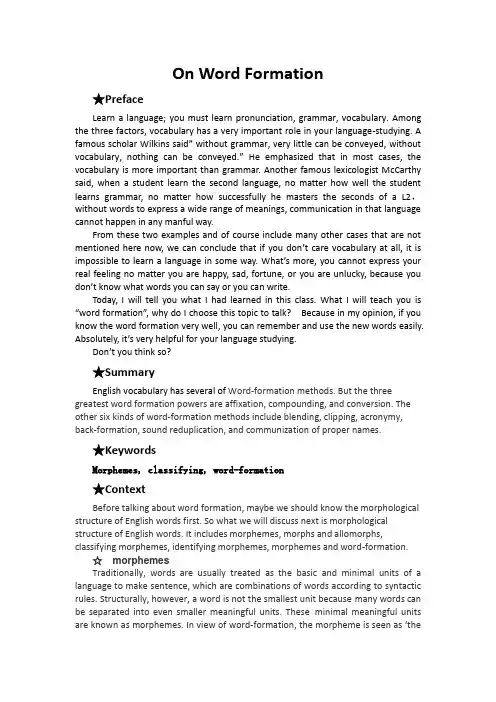
On Word Formation★PrefaceLearn a language; you must learn pronunciation, grammar, vocabulary. Among the three factors, vocabulary has a very important role in your language-studying. A famous scholar Wilkins said” without grammar, very little can be conveyed, without vocabulary, nothing can be conveyed.”He emphasized that in most cases, the vocabulary is more important than grammar. Another famous lexicologist McCarthy said, when a student learn the second language, no matter how well the student learns grammar, no matter how successfully he masters the seconds of a L2,without words to express a wide range of meanings, communication in that language cannot happen in any manful way.From these two examples and of course include many other cases that are not mentioned here now, we can conclude that if you don’t care vocabulary at all, it is impossible to learn a language in some way. What’s more, you cannot express your real feeling no matter you are happy, sad, fortune, or you are unlucky, because you don’t know what words you can say or you can write.Today, I will tell you what I had learned in this class. What I will teach you is “word formation”, why do I choose this topic to talk? Because in my opinion, if you know the word formation very well, you can remember and use the new words easily. Absolutely, it’s very helpful for your language studying.D on’t you think so?★SummaryEnglish vocabulary has several of Word-formation methods. But the three greatest word formation powers are affixation, compounding, and conversion. The other six kinds of word-formation methods include blending, clipping, acronymy, back-formation, sound reduplication, and communization of proper names.★KeywordsMorphemes, classifying, word-formation★ContextBefore talking about word formation, maybe we should know the morphological structure of English words first. So what we will discuss next is morphological structure of English words. It includes morphemes, morphs and allomorphs, classifying morphemes, identifying morphemes, morphemes and word-formation.☆morphemesTraditionally, words are usually treated as the basic and minimal units of a language to make sentence, which are combinations of words according to syntactic rules. Structurally, however, a word is not the smallest unit because many words can be separated into even smaller meaningful units. These minimal meaningful units are known as morphemes. In view of word-formation, the morpheme is seen as ‘thesmallest functioning unit in the composition of words’. Syn tactically, however, a morpheme is the minimal form of grammatical analysis.Morphemes are abstract units, which are realized in speech by discrete units known as morphs. They are actual spoken, minimal carriers of meaning.Morphemes vary in function. Accordingly, we can classify morphemes into several general categories:①Free versus Bound Morphemes ---- morphemes which are independent of other morphemes are free. These morphemes have complete meanings in themselves and can be used as free grammatical units in sentences. Morphemes which cannot occur as separate words are bound. They are so named because they are bound to other morphemes to form words or to perform a particular grammatical function.②Derivational versus Inflectional Morphemes ---- morphemes which are used to derive new words are known as derivational morphemes because when these morphemes are conjoined, new words are derived.③Content versus Grammatical Morphemes ---- On a semantic and syntactic basis, morphemes can fall into content and grammatical morphemes. Content morphemes are lexical morphemes which are used as we see above to derive new words, so also known as derivational morphemes.☆Morphemes and Word-formationWe know that words can be analyzed into morphemes, which are the minimal meaningful units in the composition of words. In word-formation formation, however, morphemes are conventionally labeled root, stem, base and affix.Affixes are forms that are attached to words or elements to modify meaning or function. Affixes are bound morphemes because none of them can stand as words in their own right. According to the functions of affixes, we can divide them into inflectional affixes and derivational affixes. Derivational and inflectional affixes are identical with derivational and inflectional morphemes. In view of their distribution in the formation of word, affixes can fall into prefix and suffix.Before we begin our actual discussion of word-building processes, there are some basic concepts that need clarifying:1.Root: a root is the basic form of a word which cannot be further analyzedwithout total loss of identity.2.Stem: a stem may consist of a single root morpheme or of two rootmorphemes. It can be a root morpheme plus one or more affixational morphemes.3.Base: a base is referred to a form to which affixes of any kind can be added. Itcan be a root or a stem.☆ Word FormationThe expansion of vocabulary in modern English depends chiefly on word formation. There is a variety of means being at work now. The most productive are affixation, compounding and conversion.⑴AffixationAffixation is generally defined as the formation of words by adding word-formingor derivational affixes to base. This process is also known as derivation, by which new words are derived from old or base forms. The words created in this way are called derivatives. According to the positions affixes occupy in words, affixation falls into two subcategories: prefixation and suffixation.Prefixation includes:Negative Prefixes (a-, dis- ,in-, non-, un-…)Reversative or Privative Prefixes (de-, dis-, un,…)Pejorative Prefixes (mal-, mis-, pseudo- …)Prefixes of Degree or Size (arch-, co-, extra-, hyper-, macro-, micro-, mini-, out-,over-, sub-, super-, sur-, ultra-, under- …) Prefixes of Orientation and Attitude (anti-, contra-, counter-, pro-…)Locative Prefixes ( fore-, inter-, intra-, super-, tele-, trans-…)Prefixes of Time and Order ( ex-, fore-, post-, pre-, re- …)Number Prefixes ( bi-, multi-, semi-,tri-,uni- …)Conversion Prefixes ( a-, be-, en- …)Miscellaneous Prefixes ( auto- , neo-, pan-, proto-, vice- …)Suffixation includes:Noun suffixes (denominal nouns, deverbal nouns, de-adjective nouns, non andadjective suffixes)Adjective suffixes (denominal suffixes, deverbal suffixes )Adverb suffixes (Omit example)Verb suffixes (Omit example)⑵CompoundingCompounding is the formation of new words by joining two or more bases. Wordsworth formed in this way are called compounds. Compounds can be written solid, hyphenated and open.1.Characteristics of compoundsCompounds have noticeable characteristics which may in most cases differentiate themselves from noun phrases in the following four aspects: Phonological features, semantic features, grammatical, orthographical features.2.Formation of compoundsCompounding can take place within any of the word class, but the productive ones are nouns and adjectives followed by verbs to a much lesser extent.Noun compounds, adjective compounds, verb compounds.⑶ConversionConversion is the formation of new words by converting words of one class to another class. Conversion is generally considered to be a derivational process whereby an item is adapted or converted to a new word class without the addition of an affix. Hence the name zero-derivation. Words produced by conversion are primarily nouns, adjectives, and verbs.Conversion to nouns (deverbal, de-adjectival, miscellaneous conversion )Conversion to verbs (denominal, de-adjectival, miscellaneous conversion )conversion to adjectives (voiceless to voiced consonant, initial to end stress)the other six means of word-formation includes:Blending, Clipping, Acronymy, Back-formation, Sound reduplication, Communization of proper names.Because the words limit, the six word-formation methods is not detailed introduced here. If you are interested in them, please refer to the lexicology. Annotation: 《英语词汇学教程》张伟友著,《词汇学学习指南》杨春慧著。
![英语词汇学的论文怎么写[共5篇]](https://uimg.taocdn.com/6ecb7b3191c69ec3d5bbfd0a79563c1ec5dad7fa.webp)
英语词汇学的论文怎么写[共5篇]第一篇:英语词汇学的论文怎么写英语词汇学的论文怎么写?英语词汇学习在英语词汇学习过程中,学习者要遵循第二语言习得的规律,掌握并灵活运用多种词汇学习策略。
可分为词汇表策略、语境策略、精加工策略、语义场策略。
一.词汇表策略(Word list strategy)词汇表策略一般为:一列是按字母顺序排列的英语单词,另一列是这些单词的汉语意思(等值词、同义词或近义词)。
有些学者认为,通过词汇表策略能够迅速且有效地学会大量的词汇。
然而,Gaims 和Redman 却指出,通过词汇表记忆词汇会阻碍对所记词汇进行充分地处理和系统地组织,因此就失去了有效的长时记忆的基础。
语言大师桂诗春教授也认为,词汇表策略既费时又费力,徒劳无功,因为这种做法不仅把外语的词语和母语的词语等同起来,而且把它从语言和语境中孤立出来。
二.语境策略(Context strategy)语境策略就是学习者通过上下文语言环境所提供的信息对出现在语境中的生词进行猜测,从而习得这个单词。
语境策略是目前比较流行的词汇学习策略之一,它不仅仅可以扩大词汇量,而且可以让学生了解有关目的语的文化知识。
但是,Channell(Carter &McCarthy ,1988:89)认为,音节认知和重音认知对学习者理解词汇起着非常重要的作用。
为了更好地理解词汇,学习新单词的方法应使学习者准确地内化和吸收新单词:即学会单个音标的发音、了解音节数、掌握重音位置。
从这一方面来看,运用语境策略学习词汇不能算是一个很好的方法。
三.精加工策略(Elaborative strategy)精加工策略是指通过对学习材料进行深入细致的分析、加工,理解其内在的深层意义并促进记忆的一种策略。
皮连生(1998)在《学与教的心理学》一书中也曾提到:“精细加工策略”(同“精加工策略”)指对学习材料作精细的加工活动,即通过在要记忆的材料上增加相关的信息来达到对新的材料记忆的学习方法。
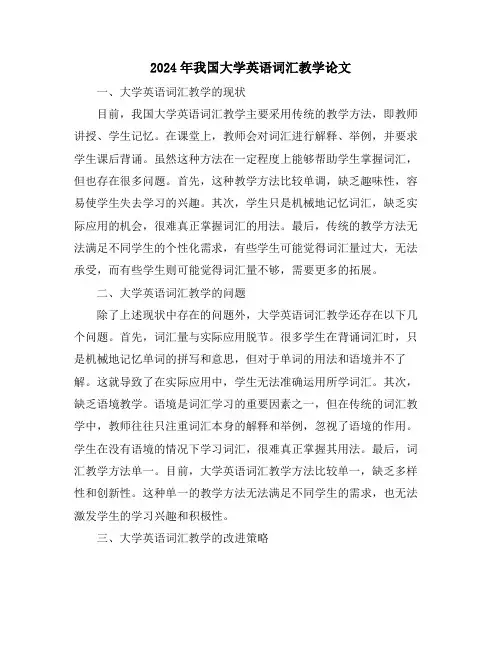
2024年我国大学英语词汇教学论文一、大学英语词汇教学的现状目前,我国大学英语词汇教学主要采用传统的教学方法,即教师讲授、学生记忆。
在课堂上,教师会对词汇进行解释、举例,并要求学生课后背诵。
虽然这种方法在一定程度上能够帮助学生掌握词汇,但也存在很多问题。
首先,这种教学方法比较单调,缺乏趣味性,容易使学生失去学习的兴趣。
其次,学生只是机械地记忆词汇,缺乏实际应用的机会,很难真正掌握词汇的用法。
最后,传统的教学方法无法满足不同学生的个性化需求,有些学生可能觉得词汇量过大,无法承受,而有些学生则可能觉得词汇量不够,需要更多的拓展。
二、大学英语词汇教学的问题除了上述现状中存在的问题外,大学英语词汇教学还存在以下几个问题。
首先,词汇量与实际应用脱节。
很多学生在背诵词汇时,只是机械地记忆单词的拼写和意思,但对于单词的用法和语境并不了解。
这就导致了在实际应用中,学生无法准确运用所学词汇。
其次,缺乏语境教学。
语境是词汇学习的重要因素之一,但在传统的词汇教学中,教师往往只注重词汇本身的解释和举例,忽视了语境的作用。
学生在没有语境的情况下学习词汇,很难真正掌握其用法。
最后,词汇教学方法单一。
目前,大学英语词汇教学方法比较单一,缺乏多样性和创新性。
这种单一的教学方法无法满足不同学生的需求,也无法激发学生的学习兴趣和积极性。
三、大学英语词汇教学的改进策略针对以上问题,本文提出以下改进策略。
首先,加强词汇应用训练。
教师应该注重词汇的实际应用训练,让学生在语境中学习词汇,了解词汇的用法和语境。
同时,教师还可以通过组织小组讨论、写作等活动,为学生提供更多的实践机会,让学生在实际应用中巩固所学词汇。
其次,引入语境教学。
语境教学是一种有效的教学方法,可以帮助学生更好地掌握词汇。
在教学中,教师应该注重语境的创设,让学生在语境中学习词汇,了解词汇的用法和语境。
同时,教师还可以利用多媒体等教学工具,为学生创造更加真实的语境,提高词汇教学的效果。
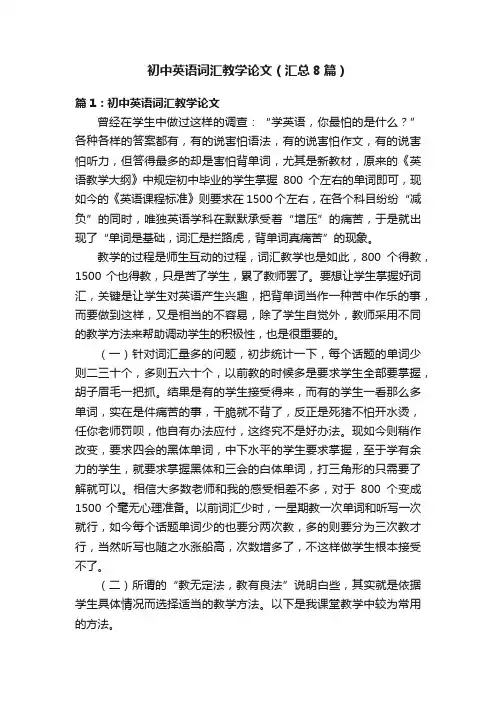
初中英语词汇教学论文(汇总8篇)篇1:初中英语词汇教学论文曾经在学生中做过这样的调查:“学英语,你最怕的是什么?”各种各样的答案都有,有的说害怕语法,有的说害怕作文,有的说害怕听力,但答得最多的却是害怕背单词,尤其是新教材,原来的《英语教学大纲》中规定初中毕业的学生掌握800个左右的单词即可,现如今的《英语课程标准》则要求在1500个左右,在各个科目纷纷“减负”的同时,唯独英语学科在默默承受着“增压”的痛苦,于是就出现了“单词是基础,词汇是拦路虎,背单词真痛苦”的现象。
教学的过程是师生互动的过程,词汇教学也是如此,800个得教,1500个也得教,只是苦了学生,累了教师罢了。
要想让学生掌握好词汇,关键是让学生对英语产生兴趣,把背单词当作一种苦中作乐的事,而要做到这样,又是相当的不容易,除了学生自觉外,教师采用不同的教学方法来帮助调动学生的积极性,也是很重要的。
(一)针对词汇量多的问题,初步统计一下,每个话题的单词少则二三十个,多则五六十个,以前教的时候多是要求学生全部要掌握,胡子眉毛一把抓。
结果是有的学生接受得来,而有的学生一看那么多单词,实在是件痛苦的事,干脆就不背了,反正是死猪不怕开水烫,任你老师罚呗,他自有办法应付,这终究不是好办法。
现如今则稍作改变,要求四会的黑体单词,中下水平的学生要求掌握,至于学有余力的学生,就要求掌握黑体和三会的白体单词,打三角形的只需要了解就可以。
相信大多数老师和我的感受相差不多,对于800个变成1500个毫无心理准备。
以前词汇少时,一星期教一次单词和听写一次就行,如今每个话题单词少的也要分两次教,多的则要分为三次教才行,当然听写也随之水涨船高,次数增多了,不这样做学生根本接受不了。
(二)所谓的“教无定法,教有良法”说明白些,其实就是依据学生具体情况而选择适当的教学方法。
以下是我课堂教学中较为常用的方法。
1音标教学法:七年级英语刚入门时,教师在字母教学法中应该融入音标教学,可以要求学生学会制作音标卡,并要求他们背诵48个国际音素。
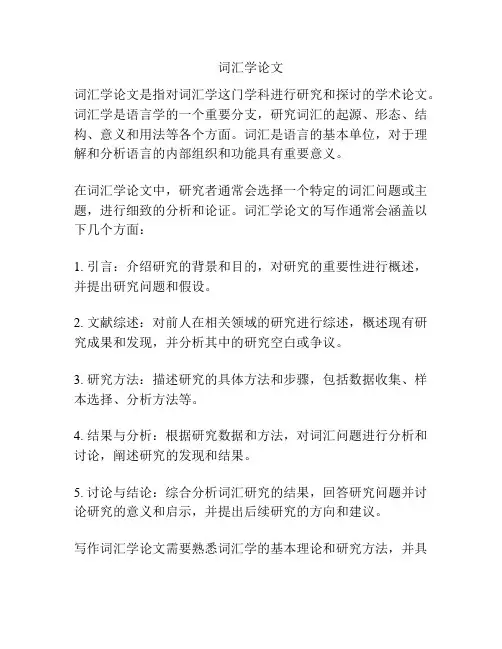
词汇学论文
词汇学论文是指对词汇学这门学科进行研究和探讨的学术论文。
词汇学是语言学的一个重要分支,研究词汇的起源、形态、结构、意义和用法等各个方面。
词汇是语言的基本单位,对于理解和分析语言的内部组织和功能具有重要意义。
在词汇学论文中,研究者通常会选择一个特定的词汇问题或主题,进行细致的分析和论证。
词汇学论文的写作通常会涵盖以下几个方面:
1. 引言:介绍研究的背景和目的,对研究的重要性进行概述,并提出研究问题和假设。
2. 文献综述:对前人在相关领域的研究进行综述,概述现有研究成果和发现,并分析其中的研究空白或争议。
3. 研究方法:描述研究的具体方法和步骤,包括数据收集、样本选择、分析方法等。
4. 结果与分析:根据研究数据和方法,对词汇问题进行分析和讨论,阐述研究的发现和结果。
5. 讨论与结论:综合分析词汇研究的结果,回答研究问题并讨论研究的意义和启示,并提出后续研究的方向和建议。
写作词汇学论文需要熟悉词汇学的基本理论和研究方法,并具
备相关的研究技巧和分析能力。
同时,严谨的逻辑思维和清晰的表达能力也是写好词汇学论文的关键。
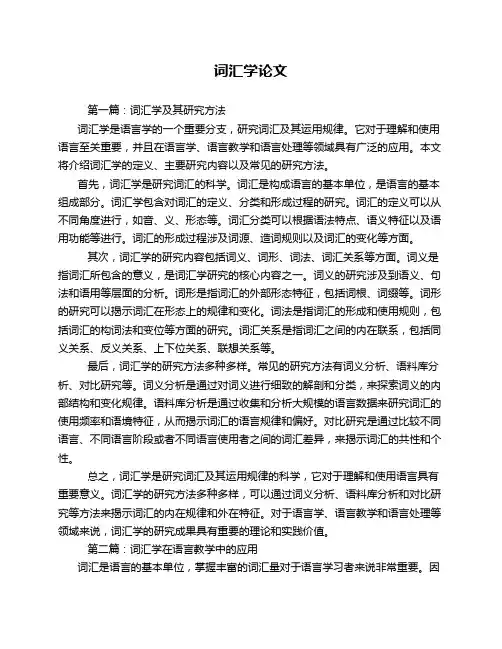
词汇学论文第一篇:词汇学及其研究方法词汇学是语言学的一个重要分支,研究词汇及其运用规律。
它对于理解和使用语言至关重要,并且在语言学、语言教学和语言处理等领域具有广泛的应用。
本文将介绍词汇学的定义、主要研究内容以及常见的研究方法。
首先,词汇学是研究词汇的科学。
词汇是构成语言的基本单位,是语言的基本组成部分。
词汇学包含对词汇的定义、分类和形成过程的研究。
词汇的定义可以从不同角度进行,如音、义、形态等。
词汇分类可以根据语法特点、语义特征以及语用功能等进行。
词汇的形成过程涉及词源、造词规则以及词汇的变化等方面。
其次,词汇学的研究内容包括词义、词形、词法、词汇关系等方面。
词义是指词汇所包含的意义,是词汇学研究的核心内容之一。
词义的研究涉及到语义、句法和语用等层面的分析。
词形是指词汇的外部形态特征,包括词根、词缀等。
词形的研究可以揭示词汇在形态上的规律和变化。
词法是指词汇的形成和使用规则,包括词汇的构词法和变位等方面的研究。
词汇关系是指词汇之间的内在联系,包括同义关系、反义关系、上下位关系、联想关系等。
最后,词汇学的研究方法多种多样。
常见的研究方法有词义分析、语料库分析、对比研究等。
词义分析是通过对词义进行细致的解剖和分类,来探索词义的内部结构和变化规律。
语料库分析是通过收集和分析大规模的语言数据来研究词汇的使用频率和语境特征,从而揭示词汇的语言规律和偏好。
对比研究是通过比较不同语言、不同语言阶段或者不同语言使用者之间的词汇差异,来揭示词汇的共性和个性。
总之,词汇学是研究词汇及其运用规律的科学,它对于理解和使用语言具有重要意义。
词汇学的研究方法多种多样,可以通过词义分析、语料库分析和对比研究等方法来揭示词汇的内在规律和外在特征。
对于语言学、语言教学和语言处理等领域来说,词汇学的研究成果具有重要的理论和实践价值。
第二篇:词汇学在语言教学中的应用词汇是语言的基本单位,掌握丰富的词汇量对于语言学习者来说非常重要。
词汇与语境研究的论文(大全五篇)第一篇:词汇与语境研究的论文摘要:语境意义包括语言语境意义、情景语境意义、文化语境意义、社会文化意义、联想意义等。
同时,词义还随着社会文化的发展变化而变化。
因此,词汇教学不能脱离于他们的使用环境,即语境。
拟就语境在词汇教学中的作用进行探讨。
关键词:语言语境意义;情景语境意义;文化语境意义;社会文化意义;联想意义引言词汇除了基本意义之外,还有丰富的语境意义。
一般来说,语境意义包括语言语境意义,情景语境意义;文化语境意义,社会文化意义,联想意义等。
同时,词义还随着社会文化的发展变化而变化。
因此,词汇教学不能脱离于他们的使用环境,即语境。
本文拟就语境在词汇教学中的作用进行探讨。
语境与词义的基本关系Geffrey Leech 说:“语境是语言交际中不能忽视的一个重要因素。
”这是因为语境对于正确理解词义,话语意义以及正确选择词语表达思想起着非常重要的作用。
可以说,对于一个词准确透彻的理解是依赖语境的帮助来实现的。
马林诺夫斯基把语境分为三类,即话语语境、情景语境和文化语境。
简单的说,话语语境是指字、词、句、段等的前后可帮助确定其意义的上下文。
情景语境是语篇指产生的环境。
文化语境是指某种语言赖以根植的民族里人们思想和行为准则的总和。
伦敦学派的核心人物物弗斯接受并发展了马林诺夫斯基的情景语境理论,他指出:情景语境不仅包括说出来的话,而且还包括说话人的面部表情、手势、身体的姿势,所有参与交谈的人以及这些人所处的那一部分环境。
关于语境与词义的关系,Firth说:“You shall know a word by the company it keeps。
”他认为在任何语言中,一定的词总是结伴出现。
他所讲的“结伴”关系,就是狭义上的语言语境。
“结伴”可以是搭配关系,前后文以及词与词之间的语境联系。
一个词的准确意义在这种语境(结伴)关系中充分体现出来。
语言学家Linda Taylor也说:“只能在词与词的相互联系中来理解掌握词义”。
浅谈英语基本构词方法(时莉阜阳师范学院信息工程学院08级英语1班 236041)【摘要】语言是随着人类社会的不断发展而发展的。
一些旧词的过时意味着需要人们创造出一些新的词,而新词的产生,也大体上服从一定规则,有其规律可循。
语言的这种“弃旧创新”不断完善和发展的过程体现出的就是一种规律----构词法。
语言学家把这种专门研究词形变化现象和规则的学问称为词形学, 通常简称为构词法。
中国的汉字传说是仓颉造出来的,英语中没有类似的说法。
但是英语研究者也象中国学者把汉字分成象形、指事、会意、形声、转注、假借等六书一样。
构词法从结构来看,现代英语的单词主要有四种类型:根词(root words)、派生词(derived words)、复合词(compounds)和缩略词(shortenings)。
从构词方法来看,能产性最强的构词法有三种:转化法(conversion)、派生法(derivation)和合成法(composition)。
文章拟从合成、派生、转化三个方面说明英语语言的构词方式和特点。
【关键词】英语构词法;合成法;派生法;转类法;分析一、构词法的定义英语构词法就是按照语法规则构成新词的方法,同一个词根如果添上或去掉不同的词缀,可以构成一系列不同的派生词。
二、英语构词法的种类(一)合成法由两个或两个以上的词干或独立的词组合起来构成新词的方法,叫合成法,亦称复合法。
合成法构成的词有三种:复合词、结合词和合成语派生词。
1)复合词:按其词素之间的关系分为主从复合词,如blackboard(黑板),其中board是主导词干, black是从属词干;并列复合词,如oillamp(油灯),其中oil和lamp具有并列关系,即同等地位。
按复合词的词类,又可分为:a.复合名词,如editor-in-chief(总编辑);b.复合形容词,long-sighted(远视眼的);c.复合动词,如whitewash(涂白);d.复合副词,如sideways(横着), part-time (半日制);e.复合代词,如whatever(无论什么), somebody (某人);f.复合介词,如into(进入), throughout (贯穿)等2)结合词:结合词由两种语言词素结合而成,其中有许多拉丁语和希腊语同其它词结合使用。
[标签:标题]篇一:《英语词汇学教程》论文(中文版)英语词汇学论文(中文版)单词记忆法细谈一,读音规则记忆法它就是按照元音字母、元音字母组合、辅音字母及辅音字母组合在开音节和闭音节的读音规律记忆。
例如:ea,ee,er,ir,ur,or分别能发[i:][:][:]等。
还有些固定的字母组合,例如:ing发[i],ly发[li],ty发[ti]和各种前缀、后缀,例如:a-,re-,un-,dis-,im-;-ed,-ing,-ly,-er,-or,-ful,-y等都有其比较固定的发音。
掌握了这些规则,记单词时就不必一个字母一个字母地记忆了。
二.字母变化记忆法英语单词中以某个单词为基础,加、减、换、调一个字母就成了另一个新单词。
具体方法如下:1.前面加字母。
例如:is/his,ear/near/hear,read/bread2.后面加字母。
例如:hear/heart,you/your,plane/planet3.中间加字母。
例如:though/through,tree/three,for/four4.减字母。
例如:she/he,close/lose,star/tstar5.换字母。
例如:book/look/cook,cake/lake/wake/make/take6.调字母(即改变字母顺序)。
例如:blow/bowl,sing/sign,from/form三.联想记忆法在日常生活中可以根据所处的环境,所见到、所摸到的事物,联想相关的英语单词。
例如:打球时联想到:ball,(play)basketball,(play)football,(play)volleyball,playground等等;吃饭时联想到:dining-room,(have)breakfast,(have)lunch,(have)supper等等;睡觉时联想到:bed,bedroom,gotobed,sleep,gotosleep,fallasleep等等。
一。
The Development of English VocabularyThere are about one million English words in all. English is also an international language in this society. You can see English words almost every where, even in non-English-spoken countries.How does English come into being? Why it has so many vocabularies? In the following passage, I will give you a general picture about these two questions. The English people are of a mixed blood. The early inhabitants of the island we now call England were Britons, but in fact all the races were the invaders came from Europe. Nobody knows very much about Britain before the Romans came during the first century BC, but there had been at least three invasions before that. The first of these was by a dark-haired Mediterranean race called the Iberians. The other two were by Celtic tribes: one is Gaels, whose descendants are the modern Scots and Irish; another is the Britons, who gave their name to the whole island of Britain. These were the people whom the Romans conquered. The Romans gave the Britons a good deal of their civilization. Then at the beginning of the fifth century Britain was invaded by three tribes from the northern Europe: the Angles, the Saxons, and the Jutes. These three tribes merged into one people, and the three dialects they spoke naturally grew into a single language, the English language.But at first, the English word made up of only a small part of native words and some borrowed words. The native words were the core words of English. According to a kind of classification of language, English is classified as a Teutonic language, which is a Germanic language. To be more exact, English belongs to the low West Germanic branch of the Indo-European family. Because of the complex history of Briton, the language of English is of a mixed character. On one hand, it shares with West Germanic languages many common words and similar grammatical structures. On the other hand, more than half of the English vocabulary is derived from Latin and French. Besides, English has accepted words from other languages of the world in the course of its historical development.The history of English language is divided into three periods:1. the old English period ( from 450AD to 1150 AD )2. the middle English period ( from 1150AD to 1500AD )3. the modern English period ( from 1500AD up to now )As I mentioned above, in fact, that there is also a period we can call it thepre-old English period, which includes the Celts, the Scottish and Irish races and culture, and also Welsh race and culture were brought by the Celts. Then the Romans brought Latin alphabet and civilization to this land. After these two were the formation of the Anglo-Saxons people, which is the original English race and language.Old English consists mainly about the native language of Anglo-Saxons people. The period from 450AD to 1150AD is known as the old English period, and it isalso been called Anglo-Saxons period. It is described as the period of full inflections, since during most of this period the case endings of the noun, the adjective, and the conjugation of the verb were not weakened. Also during this period, when the Norman Conquest in 1066AD brought French to England, and much of the English vocabulary was replaced by words borrowed from French and Latin.Old English is a synthetic language. (There are two classes of languages in the world: synthetic and analytic. A synthetic language is one which shows the relation of words in a sentence largely by means of inflections. An analytic language is one which indicates the relation of words in a sentence by means of word order, prepositions or auxiliary verbs, rather than by inflections.) Old English nouns and adjectives have four cases: the nominative case, the genitive case, the dative case and the accusative case. Apart from these four cases, Latin nouns have the ablative and locative cases.Middle English period is from 1150AD to 1500AD. During this period the inflections which had begun to break down towards the end of the old English period, became greatly reduced, and it is known as the period of leveled inflections. The Norman Conquer was the cause of this change. The change of this period had a great effect on both grammar and vocabulary. In grammar English has changed from a highly inflected language to an analytic language. In this period many old English words were lost, but thousands of words borrowed from French and Latin appeared in the English vocabulary. French influence on the English vocabulary is much more direct and observable. The number of French words that came into English was very numerous. More than half of the English vocabulary is derived from Latin.Modern English period is from 1500 to the present. A large part of the original inflectional system has disappeared, and it is known as the period of lost inflections. We may divide this period into two parts: the early Modern English period and the Late Modern English period.The early modern English period extends from 1500AD to 1700AD. The chief influence of this time was the great humanistic movement of the Renaissance. In this period the study of the Latin and Greek classics was stressed, so the influence of Latin and Greek on English was great.The late modern English period started after 1700AD. The eighteenth century in England was a time of stabilizing and purifying the English language. The publication in 1755AD of A Dictionary of the English Language edited by Samuel Johnson was a typical example of consolidating and purifying the English language in this period. He set a standard for using English words in spelling, meaning and usage. In the eighteenth century French greatly influenced English. The number of French words in the period from 1650AD to 1800AD increased rapidly. Such as: ballet, cartoon, champagne, cohesion, dentist, patrol, publicity, routing, etc.Meanwhile the territorial expansion of the English empire in this period resulted in the expansion of the English vocabulary. Thus, there are many words flow into English vocabulary, which includes American Indian words, Mexican words, Peru words, Brazil words, India and African words.The nineteenth and twentieth centuries are a period of rapid expansion for the English vocabulary in the history of the English language. In this period many changes have taken place. Especially the great development of science and technology is reflected in the English vocabulary.Besides, the great changes in industry, in political and social lives, in sports and amusements all have contributed a great deal to the English vocabulary. Since the Second World War the English vocabulary has been affected powerfully by social, political, economic, especially scientific and technical changes. The English vocabulary not only changes, but also changes quickly in this period. Thousands of new words are added, existing words acquire new meaning and old words die out.Till now, the English vocabulary is still changing, some words come out and some die out. In a word, as society is constantly in a state of development, so is language. Society depends on language for its existence. As society develops new objects are created that require the invention of new words and expressions. Therefore, the changing of English vocabulary is an endless changing process.Bibliography:陆国强,published in 1999,Modern English Lexicology (new edition)Adams, Valerie, published in1982,An Introduction to Modern English Word-formation戴炜栋,published in 2002,A New Concise Course on Linguistics for Students of English朱永涛,published in 1997,The Society and Culture of Major English-speaking Countries林承璋,published in 1987,An Introduction to English Lexicology也可以写广告中的词汇特点:The Lexical Features of Advertisement on NewspaperNewspapers are generally the cheapest way to reach a mess audiences,and the timing is fast.Adverments make an important part on English Newspaper.We live in a world of advertising.Advertising provides a valuable service to society and its members,because it defines for consumers the meaning and the role of products,services and institutions.Newspaper advertisements’ main text use words for the spread of vector,and must must be simple eye-catching,because of the layout of resources.To some extent,thenewspaper advertisements content mainly rely on language toexpress.Advertising language ,playing a role of communication and persuasion,has developed its own features.Naturally,advertisements in English have become an important means of communicatingideas,demoinstrating a variety of linguistic features of its own.The present study discusses some lexical features of English advertisement texts.ⅠChoose the simple wordsAdvertiment language must be easily understood terms so that readers can get information as soon as possible.In advertising,simple words can win the consumers by their exact,effective expression an d a kind of closeness.E.g.①Take time.Any time.Continuous using two “time” can make the language simple and clear.②Once tasted,always loved.The article should be clearly and concisly understood in order to arouse the interest of customers on food which make them mouth-watering.③My goodness!My Guinness!Common language facilitate people to memory and speak,this reproduce the scene of people driking the Guinness beer which is full of praise.ⅡFrequent Employment of Simple VerbsSimple verbs are frequently employed in English advertisements, which is an obvious wording characteristics of English advertising texts.Verbs are the most important part of language.It is a prominent feature in adervertising english that verbs are regularly used for the ultimate goal of advertising ,which is to enable consumers to buy their goods.So in terms of the using of words,dynamic and strong word will produce a better feeling effects.Verbs can be used to “touch”the consumer's heart.In this way,they will have impules to buy the goods.E.g.①Drink Coca-Cola.②I want you to sponsor a Rice Paddy Baby.③For incredible speed and accuracy, try the Minolta 7000, the world’s first body-integral auto-focus SLR.In the above examples, “try”,”sponsor” and “drink”are to fulfill the “get action” requirement seem more euphemistic and even more attractive.④Get noticed. Get results.⑤Feel the Hyatt Touch.⑥Send today for your free sample, and try the new flavor.After reading the above ads, we feel encouraged to take buying action or make repeated purchases. The active voice doesn’t force people to take the passive action while it makes people feel that they do something of their own accord. Ⅲ. Adjectives⑴It is hard for us to think of any really persuasive message without the use of descriptive and vivid adjectives. Copywriters like to use a large number of adjectives not only to describe the quality and features of the products or services, but to a great extent to praise and beautify them.E.g.For people who care about their bodies, Dairy Farm brings fresh skimmed milk. With almost no fat, it keeps your body fit inside and outside, fresh skimmed milk. Fresh Dairy Farm.The adjective “fresh” in Example appears three times to emphasize how fresh the product is, making its quality particularly attra ctive. And the adjective “fit” points out the remarkable function of the product.⑵The copywriter tends to select the superlative or comparative forms of adjectives that carry positive meanings so as to make a comparison and stress the wonderful qualities of the advertised product. E.g.①Using Dove, I do feel 20 years younger.“Younger” just emphasizes the magic power of the product.②Discover the season’s newest splendor.The word “newest” , which is an advertisement of a kind of perfume, means “fashionable to the highest degree”.Of course, the advertisers must make sure that the advertised goods or services are actually the best in the same category.Sometimes people do not know how superb the goods or the services are in quality. Anyhow, people tend to believe what is said in advertisements.Ⅳ.New Words Constantly AppearIn order to attract people’s attention, copywriters like to create some new words which are more active. The new words are mainly used for truthfulness, humor or emphasis in English advertising texts. E.g.①Surefit Shoe Ltd.“Surefit” is a new word which makes consurms thing of a sentence”Surely to fit your feet”.That means the shoes are fot for your feet.②Give a Timex to all, and to all a good time.The well-known watch brand “Timex” is a variation of “Time + Excellent”, wh ich persuasively shows the merit of the watch brand. Thus, brand names get and retain a unique image.Ⅴ.PronousPronouns of the first and second person: we, I and you outnumber the other pronouns in advertisements. It is because that you, we and I help create a friend-like intimate atmosphere to move and persuade the audience. The audience will easily accept a product, a service or an idea as if a good friend recommended them.Sometimes,we use infinitive pronouns,such asall,everyone,none,nothing and so on in order to feflect the extraordinarycharacteristics of a particular commodity or it has been spending and receiving most of people.E.g.Our finest time.It is about a well-known red wine.A pair of lover drink together at romantic atmosphere.Ⅵ.Compound wordsA compound word is often a noun or an adjective made up of two or more words which are frequently used to express more information in limited space. Especially,compound adjectives are often seen in advertisements.E.g.Kodak Single-use-came ras take pictures where you wouldn’t normally take your camera.It used the compound word skillfully and describe the capability and function of the product incisively and vividly.Now we have briefly discussed the six wording characteristics of English advertisements. We have got to know that simple verbs and concise adjectives are very important words in English advertising, and that new words which are attractively used to stress the new and special qualities or functions of the advertised products. Language in advertising presents us with a colorful, interesting and wonderful world in order to serve the purpose of attracting advertising readers. Of course, besides the above features discussed in this study, there is much more for further study in advertising language.Email:********************。
On native words and borrowings in the English vocabulary AbstractAs time goes on, great changes have taken place in native English vocabulary. In addition to the inner evolvement of itself, it has also absorbed more and more borrowings from other culture. This essay will focus on exactly this subject. The main parts in this paper are: ①to exhibit the basic conceptions regarding native words and borrowings in English vocabulary;②to discuss the major features of English native words;③to discuss the major sources and features of borrowings in the English vocabulary; ④to explore the interrelation between the native and foreign elements in the English vocabulary.⑤to make a conclusion of the whole paper.Key words native words borrowings English vocabularyChapter 1 Basic Information about Native Words in English Vocabulary1、1 Definition of Native WordsWe should first make clear the exact definition of native words or borrowings no matter what we are going to discuss about them next.According to some dictionaries and books of lexicology, native words refer to words which originated in the region where it is used. To put it simple, native words are words that are not foreign or imported.Specifically, as for English vocabulary, native words are words brought to Britain in the fifth century by the Germanic tribes, namely the angles, the Saxons, and the jutes, thus known as Anglo-Saxon words. Though words of Anglo-Saxon origin are small in number, they stand at the core of the language.1、2 Features of native wordsGenerally speaking, native words have these features below:First, they are neutral in style. That is to say, native words are usually neither formal nor informal. This is because native words denote the commonest things in human society. Almost all the people use them in all places, on all occasions, and at all times. Take the word begin and commerce for instance. Begin is a typical native word and commerce is a borrowing.Obviously, we use begin neither formally or informally. However we use commerce mostly in formal occasions.Second, they are frequent in use. Native words are the foudation and the core of the English vocabulary. Native words are most frequently used in everyday speech and writing. The percentage of native words in use reaches usually as high as 70 to 90 percent.Third, in structure they are mostly monosyllabic words.Fourth, in meaning they express the fundamental concepts dealing with everyday objects and things. At the same time, they are highly polysemic words, that is, they have many meanings.Fifth, in grammar they include most parts of speech.Sixth, they are of collocability. Many commonly-used expressions and phrases in English are made up of native words.Seventh, they are good at forming word in modern English. Native words in modern English can form a great number of derivatives. For example, watery and waterless are both the derivatives of water. Native words in modern English can also form many compounds. For example, the word fire can form many compounds, such as fireman, firefighter, fireplace and firebrand and so on.Chapter 2 Basic Information about Borrowings in English Vocabulary2.1 Definition and Main Features of BorrowingsBorrowings, or borrowed words, or loan words, refers to the words taken from foreign language.As a language which owns the most speakers, English has adopted words from almost all other major languages in the world. As is stated in Encyclopedia Americana, “the English language has vast debts. In any dictionary some 80% of the entries are borrowed”. Thus the English language is called “a heavy borrower”. Here “borrowing” is not real “borrowing”. It has nothing to with returning. It’s merely a metaphor stands for the foreign words from a different culture. But not all foreign words do become borrowings. If they fall out of use before they become widespread, they do not reach the borrowing stage.Through analyzing the borrowings in English vocabulary, we can find some common features among them.First, borrowings in English vocabulary usually do not have relative native words with the same meaning with them. When this is the case, certain concepts, ideas or objects of the “lending”language community are new to the people of the “borrowing” language community. So instead of making up a complete whole new word for the idea or object they simply borrow the word from the people they came in contact with.Second, borrowings are usually words that refer to exotic ideas, concepts or objects. An example of this is how names of animals that do not inherently come from Great Britain are often loanwords in English. The name of the animal is borrowed from the language that is spoken in the country in which the animal originally comes from or lives in.Third, most of the borrowings in English vocabulary are nouns. Nouns and lexical words in general, are borrowed more frequently than grammatical words. An example of this is the word “bagel”. The word was adopted from the Yiddish language, since the Jews were those who introduced bagels to the rest of the world. Many other languages, including English, therefore borrowed the word “bagel”.Fourth, borrowings are often even more widely known than native words since their borrowing served a certain purpose, for example to provide a name for a new invention. An example of such a borrowing is “pizza”. Since the Italians were those who introduce pizzas in England, the England borrowed the word from them.2.2 Major Sources of Borrowings in the English VocabularyTo discuss this question, we should first get to know the exact meaning of “source of borrowing”. Here it refers to the place where the borrowing was borrowed.Generally speaking, Latin, Greek and French are the three languages that have contributed most to the English language. Other foreign languages that have contributed words are of less importance.That is to say, Latin, Greek and French are the three main sources where borrowings in English vocanulary come from. Apart from the three, Scandinavian, Celtic, Dutch, Low German, Arabic, Persian, Portuguese, Spanish are also the main sources of borrowings in English vocabulary. Some examples of borrowings in English voabulary are as follows.Among those borrowings that come from the Germanic are the words father, mother, brother, man, wife, tree, grass, summer, winter, bring, come, get, hear, meet, and think and so on.Such words as constitution, president, parliament, congress, city, place, , diner, café, liberty, veracity, carpenter, draper, haberdasher, mason, painter, plumber, and tailor are from France.English has acquired many words from Spanish. Some of these have been borrowed directly: cigar, armada, guerrilla, matador, mosquito, and tornado.Borrowings from Latin have been especially numerous. Many of these represent combinations of Latin words: alnutrition, transfer, circumference, supernatural, submarine, suburb, substantial, contemporary, multilingual, conjunction, compassion, and hundreds more.Borrowings from Greek are heavy in the sciences and technology. In addition to macro and micro, often-used prefixes include poly and tele. Among the well-known English words from Greek are alphabet, geometry, geology, photography, psychology, pathology, biology, philosophy, telephone, logistics, and metamorphosis.Among the common English words that have come from Arabic are: alcohol, alchemy, algebra, alkali, almanac, arsenal, assassin, cipher, elixir, mosque, naphtha, sugar, syrup, zenith, and zero.Borrowings in English vocabulary are so numerous that they can not be listed one by one The above are the language sources that English vocabulary comes from. Below are the specific sources or we’d better say specific channels that borrowings come from. Generally speaking, English vocabulary mainly comes through conquest, commerce, travel, literature, mass media or some other ways. In other words, those borrowings have come into English vocabulary through the spoken word, on one hand, and through the written word, on the other hand.Chapter 3 The Interrelation between the Native and Foreign Elements in the English VocabularyIn fact, no language has so complex and varied a vocabulary as English. The English vocabulary has been adopted from more than fifty languages. As a cosmopolitan language English has no rival. That is to say, up to seventy percent of the English vocabulary consists of loan-words, and only thirty percent are native words.In spite of large-scale borrowings, it is the native words that form the basic stock of modern English vocabulary. And what’s more, native words are used in everyday speech and writing more frequently than borrowed words.Generally, the longer a borrowed word has been in the language, and the more frequently it is used, the more it resembles the native words of the language.In the course of historical development borrowed words have extended the total number of the English vocabulary, and Latin or Greek roots, prefixes or suffixes have changed the structures of English words.Chapter 4 conclusionTo sum up, we can say that English vocabulary has been marked by the word ‘borrowing’. Since early times, English has been in contact with other languages such as Greek, French, Scandinavian, Celtic, Dutch, Low German, Arabic, Persian, Portuguese, and Spanish and so on, and as a result, English vocabulary has been riched under the influence of other languages. It is native words and borrowings together help strengthen the English vocabulary and make it a very open and the most poewrful language in the modern world.Bibliography参考书目??/~kemmer/Words04/structure/borrowed.htmlhttp://www1.ku-eichstaett.de/SLF/EngluVglSW/grzega1032.pdfhttp://dooku.miun.se/engelska/englishC/C-essay/VT06/Final/NicoleFerm.pdf/~kemmer/Words/loanwords.html/media_file/200708/huashi/0809/cihuix/web/unit02.htm。
英语词汇学硕士论文范文词汇教学是大学英语教学的重要组成部分,词汇教学在一定程度上影响着是大学英语教学成败。
下面是店铺为大家整理的英语词汇学论文,供大家参考。
英语词汇学论文篇一:《探讨计算机英语词汇的构词法》缩略词是计算机英语专业词汇构成的一大显著特点,使用起来方便、简洁,易于上口,而且节省书写、打印时间及文章篇幅等。
因此,缩略词在计算机英语中的应用极为普遍,作用十分活跃。
通过教学,让学生掌握常用缩略词及其含义,对学好计算机课程有很大帮助。
计算机英语缩略词主要有以下两种形式:1.首字母缩略词。
它是由词组中每个单词的第一个字母组合构成的新词。
这些词经常出现在网络、硬件描述等方面,如PC(personalcomputer)个人电脑、WWW(WorldWideWeb)万维网、BBS(BulletinBoardSystem)电子公告系统、CAI(ComputerAidedInstruction)计算机辅助教学、IT(InformationTechnol-ogy)信息技术、LAN(LocalAreaNetwork)局域网、CPU(CentralProcessingUnit)中央处理器、OS(Oper-atingSystem)操作系统、DOS(DiskOperatingSystem)磁盘操作系统、ROM(ReadOnlyMemory)只读存储器。
当然,首字母缩略只是一种大致情况,但在某些情况下,缩略词并非按照上述缩写各单词首字母的方法进行缩写,如DatabaseManagementSystem(数据库管理系统)则缩写为DBMS、HypertextTransferProtocol(超文本传输协议)缩写为HTTP。
2.截短词。
它是计算机英语中比较特殊的词,在程序设计语言的标识符和函数名、操作系统的命令、配置文件中的属性等条目中常常见到。
截短词的构成主要有两种形式:一是截取一个完整单词的前部分来代替整个单词,旨在使用起来方便快捷、简洁高效。
The English Synonyms1、IntroductionEnglish has the largest vocabularies and synonyms in the world because it absorbed many different languages from various kinds of countries. As Baugh says, the richness of English in synonyms is largely due to the happy mingling of Latin,French and native elements.2、The origin of the English Synonyms2.1 As early as the Anglo-Saxon periodThere were many borrowing words from other countries in Europe,such as Latin ("street","mile"...),Greek("priest","bishop"...),Celtic("crag","bin"...),and Scandinavian languages ("law","egg","thrall"...) and so on.2.2 After the Norman ConquestA new kind of English language appeared,it called Norman English.The vocabulary doubled in that period because of the influx of French.French was widely used in the high society at that time in especial.For example, there were many words about eating:sugar,vinegar,boil,fry,roast and so on.About dressing,there were "garment", "robe", "mantle", "gown"and so on.About law,there were "plaintiff", "perjury" and so on. About religions,there were "convent", "hermitage", "chaplain", "cardinal" and so on. About social status,there were also some words to be expressed ,such as "prince", "count", "major" and so on.Ancient British people adopted a plenty of French vocabularies to express their feelings,behaviors and living. However,there were many words having same meanings between French vocabulary and the pre-existing Anglos-Saxon vocabulary,so a lager number of synonyms appeared. When the people wanted to say something,they can use the pre-existing Anglo-Saxon vocabulary.For example,"cure" and"heal',"table"and"board","poignant"and"sharp","labor"and"work","mirror"and"gla ss", "assemble"and"meet", "power"and"might" etc.2.3 In the RenaissanceA mass of Latin and Greek vocabularies brought into the English language because of the rapid development of the art and culture.Meanwhile,with the rapid expansion of diplomacy activity in the Crusades and the expansion of the oversea adventure in the Elizabethan period.,the cope of activity for British began to expand,it also stimulated the rapid development of the culture and language.In the sixteen century in Britain,people began to use the magnificent Greek and Latin vocabulary to talk with others,such as "aureate (华丽的)" "Inknom(文懦的)".There were a typical example:Shakespeare had written a sentence in a play ,"multiudinous seas incamadine".In Renaissance period, many classical borrowing words had been a history,but a few parts of these words was used in a specific scene,such as "hebdernodary" means "weekly","gressorial" means "having to do with walking" . 2.4 In modern timesBecause of the trade,war and diplomacy activity,the using rang of English was expanded to the Europe , North America,Indian,Australia and Africa. Many languages in different countries started to affect the development of modern English,more and more synonyms appeared in the English. For examples:languages wordsDutch tub, spool, deckSpanish cherry, armadaAmerican Indian Languages squash,toboggan,hickory,grenade East Indian language cashmere, punch, shampooAfrican veldt,trekItalian soprano,casinoMexican chocolate,tomatoAustralian kangaroo,billabongJapanese kimono,rickshawMalay amok,sarongEspecially for the highly developing of America, American English was recognized and respected in the world.A plenty of synonyms appeared in British English andAmerican English. There are some examples as following.American Britishhelp servantsidewalk pavementelevator liftrailway railroaddruggist chemistcheckers dr-aughtsgasoline petroltruck of a car boot of a car【.郭厚文,刘慧宝,2000:78】..But what is the English synonyms?3、The definition of the English synonymsIn Oxford advanced learner's English-Chinese dictionary【AS Hornby,2009:2050】,synonyms is defined as word or expression that has the the same meaning or nearly the same meaning as anther in the same language。
However,in Webster’s International Dictionary【Webster,1890】,synonyms is defined as a word having the same or almost the same meaning as some other, that is, one of a number of words that have one or more meanings in common, but that differ either in the range of application of those meanings or in having other senses not held in common .For example,"statesman"and "politician"means political people,but they have different emotions.4、The Types of the English SynonymsSynonyms can be classified into two major groups:absolute synonyms and relative synonyms.A) Absolute synonymsAbsolute synonyms are aways known as complete synonyms.Absolute synonyms are identical in meaning in all its aspects,both in grammatical meaning and lexicalmeaning,,including conceptual and associative meaning.Synonyms of this type are interchangeable in any content without the slightest alteration in connotative,affective and stylistic meaning.Synonyms is very rare in natural languages and some people think that these synonyms are not existent.However,it is wrong to think that synonyms is nonexistent.They maybe found in scientific terms which are precisely delimited and neutral in affective and stylistic meaning.There are examples: "spirants" and"fricative" in phonetics,"word-formation" and "word-building" in lexicology, "scarlet-fever" and "scarlatina" in medicine.B) Relative synonymsRelative synonyms are also called near-synonyms which are similar or nearly the same in denotation,but embrace different shades of meaning or different degrees of a given quality.【张维友,1999:104】E.g.:"smile" and "laugh'.'Smile" means change one's facial expression by spreading the lips,it is silent.But for"laugh" ,you must have a loud voice when you laughing. 5、.The discrimination of synonyms5.1 In degree of a a given quality or in shade of meaning .Some synonyms have the same denotative sense with difference in degree of intensity.There are some examples:A) "Small", "tiny", "diminutive", "minute", "microscopic", "miniature" are synonyms,but they denote different degrees of smallness.○1"Small" applies to things whose magnitude is determined by number,size,capacity,value,or significant. E,g:"She doodled in her small room.","He had no choice but to kip in that small inn."○2"Tiny" goes further than diminutive in suggesting extreme littleness or a smallness out of proportion to most things or in comparison with all other things.E,g.:"The drying figs sweat tiny drops of moisture.","I live a tiny world".○3"Diminutive" not only carries a stronger implication of divergence from a normal or usual size or scale than small,but it often carries the meaning of extremely or even abnormally.E.g.:"They stuffed the stove in the basement of the Houses of Parliament full of this diminutive lumber and went home from work at the end of the day.","To others, the diminutive Type 022s look like mere juicy targets for American helicopters and submarines."○4"Minute" means extremely small on an absolute scale,usually a microscopic scale,.E.g.:"I remembered in minute detail everything that had happened","Our lawyer went over the contract in minute detail."○5"Microscopic" applies to what is so minute that it is literally observable only under a microscope,such as "All the microscopic available states, that is, if I take an individual particle and I say where it can be, all those states have the same energy.","It's the electricity formed, for instance, when water vapor collects on microscopic particles of dust and other material in the air."○6"Miniature" applies to what is complete in itself but is built,drawn,or made on a very small scale,such as"in circus parades,Tom Thumb and his menage rode together in miniature red coach,drawn by two small ponies","We may thus picture an atom as a miniature solar system." B)"Anger","rage","fury","indignation" and "wrath" are synonyms,.○1"Anger",the most general term,describes merely the emotional reaction,the emotion of word itself has not deep intensity.For example,"Tom is easily aroused to anger."His criticism stems from his anger at the restrictions.".○2"Rage"means a state of extreme anger,such as"Rage overcame her and she tore her hair.","With 9/11 in America, people could ask, ‘Who are they?’ and could pour their rage out on someone else, ”he said."○3"Fury", the strongest word in the group, means state of violent mentalagitation,for example,"Now, though, it turns out that the rising fury might not have been caused by the terrorist enormity, after all.","According to reporters in the courtroom, he sat looking down in front of him as his victims gave vent to their fury." ○4"Indignation" is a feeling of righteous anger,for example,"Indignation with the feckless Greeks will be great.","This indignation is of course grounded in France's two proudest traditions: the revolution of 1789 and the Resistance.".○5"Wrath" means intense anger (usually on an epic scale),but now it is limited in use to literature and figures of speech,such as"For we which have believed do enter into rest, as he said, As I have sworn in my wrath, if they shall enter into my rest: although the works were finished from the foundation of the world.","John Steinbeck: East of Eden, The Grapes of Wrath".C)Another group of synonyms with shades of meaning is"refuse","reject",and "decline".They all mean to turn away something or somebody by not consenting to accept, receive or consider it or him.But they also have some differences.○1"Decline" often uses in respect to invitation .Such as "If the host does not do this, the people may already have something planned and therefore have to decline the invitation.","Or do you decline?","We have to decline your proposal of acting as our sole agency."○2"Reject" stresses a throwing away,a discarding or abandoning, it implies a refusal to have anything to do with person or thing.For example,"I reject these choices.","If you do not want to do that, reject them completely.","I say we should reject that little game of who’s busier than whom."○3"Refuse" is more positive,often implying decisiveness,even rude.E,g."Then why do you refuse me?","The little girl looked so pitiful; I hadn't the heart to refuse.","You can refuse me instead of cheating."【张韵斐,1986:199】D)"Clam","tranquil","serene","placid","peaceful","halcyon" mean quiet and free from all that disturbs or excites.○1"Clam" is primarily applied to sea or weather.E,g."as men for ever temp' rate,calm and wise."○2"Tranquil" implies a more settled composure,a more inherent quiet.E.g."farewell the tranquil mind.farewell content."○3"Serene" suggests a lofty and unclouded tranquility.E.g."regions mild of calm and serene air,above the smoke and stir of this dim spot which men call Earth."○4"Placid" connotes lack of excitement and suggests an unruffled and equable aspect or temper or even sometimes,in derogatory use,a hint of stupidity.E.g."she is as placid as a cow."○5"Peaceful" implies repose or the attainment of undisturbed tranquility.E.g."I am grown peaceful as old age tonight."○6"Halcyon" implies an almost magic or golden calmness especially of weather or of spirit.E.g."soft blue stone ,the color of robins eggs,or of the sea on halcyon days of summer."【Webster,1984:124】5.2 In affective meaning."Little" and "small" are synonyms .If any emotion is associated with the designation,we must choose "little",such as "a little boy",but if you want to express "poor small boy,",you should use "small"There are many synonyms having the same denotative meaning but different in effective meaning.For example"firm"and "pigheaded"."Firm" means marked by firm determination or resolution; not shakable,it often refers to things."There are a sentence:"I don't think the chair is firm enough to stand on."But "pigheaded" means obstinate and stupid,it often refers to person .E.g."He was too pigheaded to listen to reason.". We can not say"the chair is too pigheaded to sit.",it is wrong.5.3 In stylistic meaningThere are many synonyms in our daily life which have same denotative meaning but different stylistic meaning.Such as"to chide" and "to berate" both means censure severely or angrily,but the former is a literary language,the latter is a neutral language.For example,it is suitable to say"The King chided Si Lancelot for his unfaithfulness."But it is ridiculous to use it in the following sentence:I hate to chide you,son,but you must not stay out so late. Another group is "Man" and "guy",the former can refer to male and be not female.but the latter is an informal term for a youth or man,it can refer to female as plural.E.g.:"Hey guys,your dress is very beautiful."But you can not say"Hey ,man, your dress is very beautiful."6、ConclusionSynonyms are very common in our daily life.W e can use them better by knowing them.We can also reduce our mistakes of using words and improve our using level.References:[1] AS Hornby, Oxford advanced learner's English-Chinese dictionary(2009), Oxford University Press[2] Webster, Webster's New Dictionary of Synonym (1984) ,Springfield, Massachusetts, U.S.A.[3] 郭厚文,刘慧宝,《英语词汇学历史成因及考略》(2000),赣南师范学院,江南大学[4] 张维友,《英语词汇学》(1999),外语教学与研究出版社[5] 张韵斐,《现在英语词汇学概论》(1986), 北京师范大学出版社。